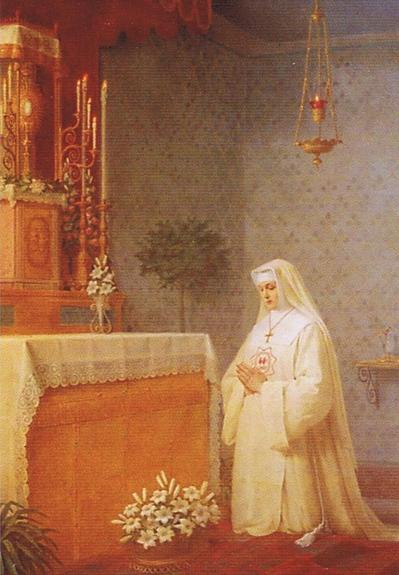
Blessed Marie de Jésus Deluil Martiny
Over and over again I asked myself, when reading that book, was it not strange that I should come across the very ideas which had been in my mind so long: namely, the longing of our Lord for more souls who would be absolutely at His mercy, His pleasure and disposal; souls in whom He could work at will, knowing that they would never resist Him, even by praying to Him to lessen the trials He was sending; souls who were willing and longing to be sacrificed and immolated in spite of all the shrinking of weak human nature.
Now I have long thought He wants that from you. And everything that is happening seems to point that way. If you make such a surrender of yourself absolutely into His hands, I know not what humiliations, trials and even sufferings may come upon you, though you must not ask for them. But He will send you grace in abundance to bear them, He will draw immense glory out of your loving crucifixion, and in spite of yourself He will make you a saint. . . This must be chiefly an act of the will, for it would be unnatural not to feel trials or humiliations; but even when the tears of pain are falling, the higher nature can rejoice. You can see this is high perfection, but it will bring great peace to your soul. Our Lord will take the work of your sanctification into His own hands, if you keep the words of the Imitation (iii. 17. i) ever before you: ‘Child, suffer Me to do with thee whatever I will.’ Do not be afraid for He would not ask this if He did not intend to find you the grace.
COMMENT: Fr Doyle wrote these words in February 1912 to a religious to whom he was giving spiritual direction, and the book to which he was referring was a biography of Blessed Marie de Jésus Deluil Martiny whose feast is commemorated today.
Blessed Marie de Jésus was the French foundress of the Congregation of the Daughters of the Heart of Jesus, a congregation especially founded to pray for priests and to offer reparation for the sins of priests. This is how Fr Doyle’s biographer, Alfred O’Rahilly, describes the charism of this congregation:
This ideal (prayer for priests) is still more conspicuously enshrined in some recent religious institutes, particularly in the Society of the Daughters of the Heart of Jesus founded by Blessed Marie de Jésus Deluil-Martiny. These sisters are “to ask by fervent prayers, by sufferings and even by their lives, if necessary, for the outpouring of grace on the Church, on the Catholic priesthood and on religious orders.” In his Brief to Mgr. van den Berghe, 14th March, 1872, Pius IX welcomed the new foundation. “It is not without consolation of heart,” said the Pope, “that we have heard of your plan to arouse and spread in your country that admirable spirit of sacrifice which God apparently wishes to oppose to the ever increasing impiety of our time. We see with pleasure that a great number of persons are everywhere devoting themselves entirely to God, offering Him even their life in ardent prayer, to obtain the deliverance and happy preservation of His Vicar and the triumph of the Church, to make reparation for the outrages committed against the divine Majesty, and especially to atone for the profanations of those who, though the salt of the earth, lead a life which is not in conformity with their dignity.”
Here is how Blessed Marie de Jésus described her calling in her own words:
To offer yourself for souls is beautiful and great but to offer yourself for the souls of priests is so beautiful, so great, that you would have to have a thousand lives and offer your heart a thousand times. . . . I would gladly give my life if only Christ could find in priests what he is expecting from them. I would gladly give it even if just one of them could perfectly realize God’s divine plan for him.
There are a number of references to Blessed Marie de Jésus in Fr Doyle’s notes and letters, and we know from much else in his life how important the ideal of priestly sanctity was for him – not only did Fr Doyle strive with all of his energy towards his own personal sanctification, but he was also the Director-General for Ireland of the League for Priestly Sanctity and he also offered up many of his great austerities for priests and in reparation for the sins of priests.
So let us copy the example of both Blessed Marie de Jésus and of Fr Doyle, and pray for our priests who face so many challenges and difficulties today, especially in Ireland.
Today is also the feast of St Gabriel of Our Lady of Sorrows, a young Passionist who died of tuberculosis before his ordination. I can find no reference to St Gabriel in Fr Doyle’s writings, but he was most certainly aware of St Gabriel – he was beatified during Fr Doyle’s lifetime, and St Gabriel features prominently in the life of St Gemma Galgani to whom Fr Doyle was devoted. That both had somewhat similar personalities: St Gabriel was apparently the life and soul of the party and was also a good shot with a gun. Fr Doyle was of course renowned for his own sense of adventure and fun, so I’m sure that the very human, and very fervent, St Gabriel would have appealed to him. The spiritual outlook was also somewhat similar. Both believed in doing ordinary things extraordinarily well and both struggled with great industry to grow in holiness through self-denial and a war on comfort and self-love.
Here are some of St Gabriel’s resolutions which are very similar in tone to those of Fr Doyle:
I will keep my rule, even the smallest thing.
I will not neglect any of my spiritual exercises.
I will shun idleness.
I will be punctual.
I will obey the sound of the bell as though it were the voice of God.
I will receive all things from the hand of God, as being sent by Him for my own personal benefit.
I will profit by every occasion for mortification that may occur.
I will fulfil exactly my ordinary duties, mortifying self in whatever would prove an obstacle to perfect obedience.
I will mortify my eyes and my tongue.
I will not leave my cell without necessity.
I will not inquire after anything through curiosity.
I will check my desire to talk.
I will increase the number of such like acts daily.
I will not take any food outside of mealtime.
I am poor and I should act accordingly.
I should be willing to put up with any inconvenience gladly.
I will not eat with avidity, but rather with reserve and with modesty, subjecting my appetite to reason.
I will mortify myself in ordinary things and whatever I feel inclined to do, saying in my heart: “O my God, I will not do this thing through mere inclination, but because it is thy will”.
I will be reserved toward those to whom I feel most inclined, prudently avoiding their presence and conversation.
I will not utter a word that might, in the least, turn to my praise.
I will not take pleasure in any praise bestowed upon me.
I will never excuse myself when I am blamed or corrected, nor even resent it interiorly, much less put the blame upon others.
I will never speak of the faults of others, even though they may be public, nor will I ever show want of esteem for others, whether in their presence or in their absence.
I will not judge ill of anyone.
I will show the good opinion I have of each one by covering up his faults.
I will consider everyone my superior, treating all with humility and reverence.
I will rejoice at the good done by others.
I will not permit myself to become interested in vain and useless things.
I will rejoice at the success of others.
I will practice charity and kindness, assisting, serving and pleasing all.
I will shun particular friendships, so as to offend no one.
Every morning and evening I will practice some act of humility, and gradually increase the number.
I will close my heart against disquiet of any kind.
I will suppress immediately all emotions of impetuosity and all affections that might cloud my mind, even lightly.
I will obey the voice of the Superior as if it were the voice of God himself.
In my obedience I will neither examine the why nor the wherefore.
I will conform my judgment to that of my Superior.
I will not employ time in conversing about purely worldly matters.
“Faithfulness in little things” is the motto I will always follow in my efforts to reach holiness.
I will try to reproduce in myself whatever I see edifying and virtuous in the conduct of others.
I will give to God the best that I have — the entire affection of my heart.

St Gabriel Possenti
